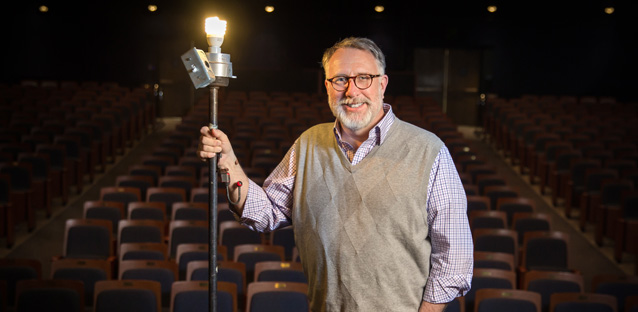Assistant Professor of Theatre Studies Rand Harmon, Ph.D., MFA, researches the conceptualization and ethics of site-based and immersive theatre.
Imagine taking a ferry to Alcatraz, the site of a former military fortress and infamous prison, a cliff-edged rock in swift currents more than a mile off the bay coast of San Francisco. You step off the ferry, unsure what to expect, wearing closed-toed shoes as instructed, a “guest” entering the world of a play taking place on the island: Hamlet.
That production of Hamlet, according to director Ava Roy of We Players theatre company (as quoted in Harmon’s analysis of the production), was an attempt to grapple with Americans’ “threshold of forgiveness” — setting a play that revolves around revenge in a crumbling prison where forgiveness had once been more or less out of reach for its inmates.
Assistant Professor of Theatre Studies Rand Harmon, Ph.D., holds an MFA in Directing from the University of Texas, and his experience includes creating site-specific theater (where the location influences the production) and immersive theater (where audiences participate in the production).
In 2007, Harmon co-founded the group Specific Gravity Ensemble, a Louisville, Ky.-based theater company that specialized in designing plays with audience engagement determined by the site where they were held. One idea: to stage a play in an elevator. The idea quickly came to life, with a local historic building hosting the production and playwrights responding to a call for two-minute-long original scripts, written to take place in an elevator. The idea was a smashing success, selling out (Harmon dryly notes that the seats were rather limited) and returning for two more years.
In 2010, Harmon began digging deeply into the meaning of such theatre for his Ph.D. in Theatre Studies from the University of Colorado-Boulder. He calls site-specific and immersive theatre “a visceral escape,” saying that “we want to live in the same environments as our stories, in real time and real life, as our society becomes increasingly isolated and isolated by digital media and less likely to participate in entertainment publicly.”
As part of his research for a guide to help other directors plan immersive and site-based experiences, Harmon spent 20 weeks in England, Scotland and Wales attending performances, interviewing creators and pondering the impact of this style of entertainment.
“We naturally bring our individual life experiences, knowledge and belief systems to interpreting what we see and experience,” he wrote in an essay after experiencing a performance in the ancient South Downs of England.
Thousands of miles away, on Alcatraz, he also attended Hamlet that year, which he held up against a tour of an ancient Buddhist site to examine why both experiences inspired feelings of sacred space.
“The very act of confronting the history of a Buddhist monument or the ruins of a notorious prison constitutes a performance,” Harmon wrote in Ecumenica, a Journal of Theatre and Performance. “As we interpret, we encode meanings on what we experience.”
But taking an audience member outside of the expected conventions of theatre comes with ethical implications, Harmon says.
In 2017, he and coauthor Penelope Cole, Ph.D., co-directed a working group of scholars to discuss the ways creative decisions and other factors affect how audiences perceive their experiences. Afterward, while he and Cole considered and collected essays from this group, Harmon proposed bringing together a panel of four scholars to explore ethical considerations concerning resident communities, disability accommodations, consent and the personal risks that might come with attending an immersive or site-based production.
The resulting collection of essays and the curated discussion was published in Theatre History Studies 2019 Vol. 38 in December 2019.
–By Rebecca Dell


